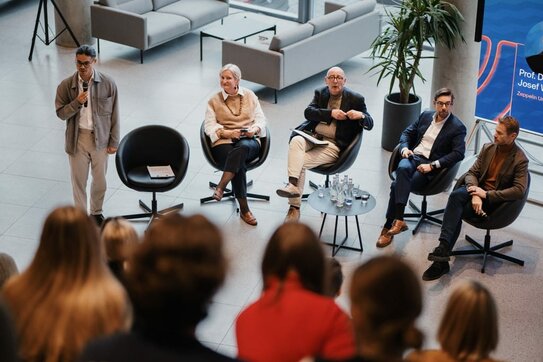Guest visit to the ISM University of Management and Economics in Lithuania
In October Professor Wieland visited the ISM University of Management and Economics in Vilnius (Lithuania). The ISM is an institution of undergraduate, graduate and post-graduate education in business, management and economics, and is one of the best business universities in the Baltics. According to Dr. Dalius Misiūnas, President of ISM university, the ISM is a platform and community, where motivated students meet experienced academics and successful business leaders. A place where future leaders learn together. During his stay, Professor Wieland took part in various formats and had the opportunity to get in touch with students and academics at the ISM.
Panel discussion about the changing landscape of ESG Regulation
The global community becomes increasingly aware of the impact of human activity on the environment, companies are facing mounting pressure to implement sustainable and socially responsible practices. In response, governments and regulatory bodies are introducing a wave of new environmental, social and governance (ESG) regulations aimed at promoting sustainable business practices and protecting the planet. 2023 looks like a standard making year for sustainability and starting from 2024, almost 50,000 companies in Europe will be subject to mandatory sustainability reporting, including non-EU companies which have subsidiaries operating within EU regulated markets.
Against this background, ISM University invited practitioners and students to a special event on the changing landscape of ESG regulation with experts from Germany and Lithuania. Together with Professor Virginija Poškutė (ISM University), Gediminas Judzentas (Marketing and Sustainability Director of the AUGA Group) and Dr. Jonathan Boyd (Senior Sustainability Consultant at VESTA Consulting), Professor Wieland discussed the new ESG regulations and their impact on companies. Dr. Jonathan Boyd gave the audience an overview of the new ESG regulations, EU taxonomies and the Corporate Sustainability Reporting Directive (CSRD). He also noted that intrinsic motivation can help drive ESG initiatives within an organization. Professor Poškutė pointed out that proactive ESG management can be a competitive advantage, and Gediminas Judzentas shared the inspiring story of AUGA Group, a company in Lithuania that develops and produces more sustainable food products as well as raw materials for food processors. The AUGA Group became one of the leading companies listed on Nasdaq Baltic in the ESG sector. Finally, Professor Wieland emphasized that ESG is also about good corporate governance and that entrepreneurship is required at an individual and organizational level to develop new business models. The event was moderated by Tobias Grünfelder, ISM guest lecturer from the Leadership Excellence Institute Zeppelin (LEIZ).
Guest lecture on relational economics and transcultural management
On October 12th, Professor Wieland gave a guest lecture in the “International Negotiations” course. As part of this lecture, the students were introduced to aspects of relational economics and transcultural management. The students from Lithuania, Belarus, Spain, France, Morocco and Slovenia discussed corporate responsibility, stakeholder management, the firm as a nexus of stakeholders, cultural complexity and management in a globalized world with Professor Wieland. In addition, the students worked on two case studies and thus had the opportunity to apply the models presented. This was a unique learning opportunity for the bachelor students.
Overall, Professor Wieland and Tobias Grünfelder from the LEIZ would like to thank the entire ISM team and especially Emilija Oleškevičiūtė, director of the International Business and Communication bachelor's degree program at ISM, for the great organization and invitation.


